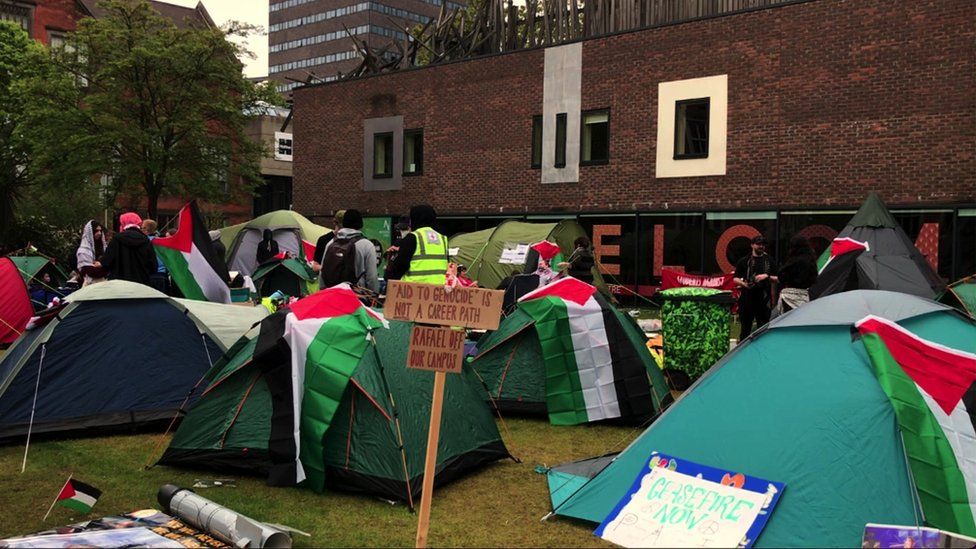Students occupy UK university campuses in protest over Gaza
- Published

Student activists at Newcastle told BBC News they wanted the university to divest from Israel
Pro-Palestinian students have occupied some university campuses in the UK, to protest against the war in Gaza.
Students in Leeds, Newcastle and Bristol set up tents outside university buildings, on Wednesday, and called for supporters to donate food, drinks and hygiene products.
Elsewhere, student activists held marches and one-off protests.
One camp, at Warwick University, has been set up in the town's piazza for a week.
The UK protests follow much larger demonstrations on campuses across the US, most prominently at Columbia University, in New York.
More than 1,000 protesters have been arrested in the US - dozens on Tuesday night, after police raided a Columbia building occupied by students for almost two weeks.
'Begin discussions'
Organisers of the Warwick protest said they had begun the occupation because the university had "ignored" previous demonstrations.
"After countless demonstrations, sit-ins, open letters and even a motion through our students union, the university hasn't even engaged with us, let alone met our demands," they said on a fundraising page.
Warwick University said it was "working to begin discussions" with the protesters about their demands.
"We recognise our students and staff have a right to voice their opinions, as freedom of speech is a vital component of university life," it said.
"We are continuing to urge everyone to respect the views of others even when they are different to their own."
Financial ties
Protesters want their universities to divest from Israel in response to its deadly military operation in the Gaza Strip.
Divestment means selling off stock in Israeli companies or otherwise dropping financial ties.
Lewi, who asked for his surname be withheld, told BBC News he had been at the Newcastle encampment since it had begun, at about 08:00 on Wednesday, and students across the country had coordinated their protests for roughly the same time.
About 60 students and staff members were there, with more expected to join for a rally later in the day, he said.
"We've tried to be democratic since 10 October, when activism on campus began," Lewi said.
"And since then, we've had no luck.
"So now, we've resorted to an indefinite encampment until the university will enter negotiations with us."
Northumbria Police told BBC News there was "a proportionate policing presence" at the protest.
'Less heavy-handed'
Lewi said the UK protests, while influenced by the Columbia occupation, were distinct.
"What's happened at Columbia has obviously inspired us to a degree but we have been thinking about this for a while," he said, adding the police response to student protests in the UK was "less heavy-handed generally than the US".
"Thankfully we're able to have our free speech on campus to a degree.
"And we're able to have freedom of assembly.
"So while the thing in Columbia has inspired us, I think there is a slight difference in what we're both wanting."
Are you affected by the issues raised in this story? Share your experiences by emailing haveyoursay@bbc.co.uk, external.
Please include a contact number if you are willing to speak to a BBC journalist. You can also get in touch in the following ways:
WhatsApp: +44 7756 165803
Tweet: @BBC_HaveYourSay, external
Please read our terms & conditions and privacy policy
If you are reading this page and can't see the form you will need to visit the mobile version of the BBC website to submit your question or comment or you can email us at HaveYourSay@bbc.co.uk, external. Please include your name, age and location with any submission.
- Published27 April
- Published26 April
- Published5 April